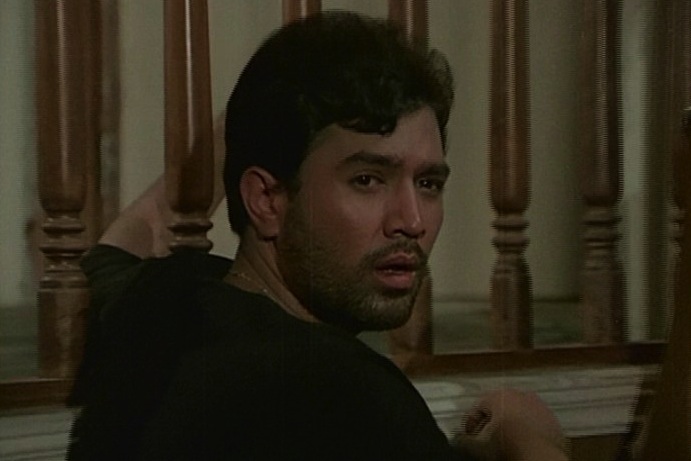Dilip Roy (Rajesh Khanna) is accused of murdering his wife Sushma (Alka). With mounting circumstantial evidence against him, he feigns insanity to avoid being convicted. However, finding life unbearable in the mental asylum, he escapes and seeks shelter in the house of a married woman, Rekha (Nanda), who is alone as her husband is away. Caught in the clutches of this madman or so she thinks who is terrorizing her, she tries to get him caught but is unsuccessful. And while hiding from a visiting doctor and a police inspector (Sujit Kumar), whom he thinks is searching for him, Dilip discovers Rekha’s husband’s corpse in the bathtub…
Ittefaq is a most interesting departure from director Yash Chopra. Normally his films are always associated with heady romance, postcard pretty locations and memorable songs but Ittefaq has none of these elements. Yet what emergences is a taut engrossing thriller that audaciously breaks all the conventions of Hindi commercial cinema prevalent then and what’s more, successfully gets away with it. The film is under 2 hours (104 minutes to be precise), is essentially a one night story, has no songs, has the hero and heroine not conventionally paired with each other, and a heroine who is an adulteress and has murdered her husband with the help of her lover!
Though said to be based on a Gujarati play, Dhummas, that Chopra had seen, there are more than uncanny similarities to the Hollywood film Signpost To Murder (1964) starring Joanne Woodward. But according to some sources, Dhummas itself was a take off from Signpost To Murder. Nevertheless, Ittefaq stands quite well on its own as an Indian noir. Though like most thrillers of the 1950s and 1960s, there are aspects of the film that have dated – like the highly regarded background music score by Salil Chowdhury for one – but on the directorial side, even today, one notices that Chopra manages to keep things going smoothly even though most of the film is in a single location with essentially just 2 characters. The pace seldom flags, the whodunit story keeps you engrossed, the suspense and the cat-and-mouse games between the two central characters hold up extremely well as the film builds up to a reasonable climax.
In keeping with experimenting with this film, there are several sequences that stand out – the extremely stylized court room sequence for one. The scene with its shadow play has a bizarre Kafkaesque feel to it.
The film is a fine vehicle for its two leads and they more than adequately hold the film together. Rajesh Khanna in his pre-Aradhana days and devoid of his typical romantic mannerisms responds with one his career’s more nuanced and edgy performances. However the scene stealer of the film is undoubtedly Nanda. Since the role was negative, Chopra had a lot of difficulty convincing actresses to take on the challenging role. It is said that among those, both Mala Sinha and Mumtaz turned it down when Chopra approached Nanda, clearly an inspired piece of casting. Today, Ittefaq is unthinkable without Nanda who makes the role her own and gives perhaps the finest performance of her career. She gives an extremely controlled and reined in performance and since she was known for her goody-goody roles, the twist works extremely well for both her and the film. The supporting cast is adequate a best but then they are not really called on to do much as the story is essentially centered on these two characters.
Incidentally, Rajesh Khanna had to be unshaven for Ittefaq and since he was shooting for Raj Khosla’s Do Raaste (1969) simultaneously, he had to appear unshaven in that film as well! And director Ravi Chopra began his career by assisting his uncle on Ittefaq.
Ittefaq proved to be a hit at the box office proving that a good film always succeeds, even if it treads away from the formulaic path. The film also won the Filmfare Award for Yash Chopra as Best Director and for Sound Recordist (MA Shaik), while Khanna, Nanda and Bindu were nominated for Best Actor, Actress and Supporting Actress respectively.
Hindi, Thriller, Color


